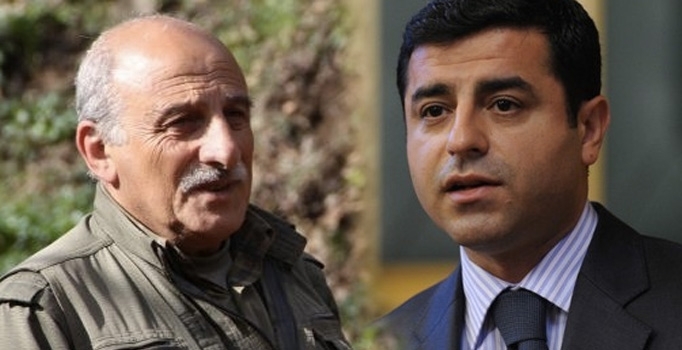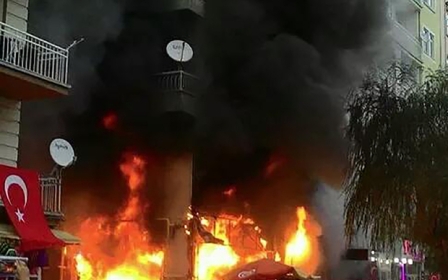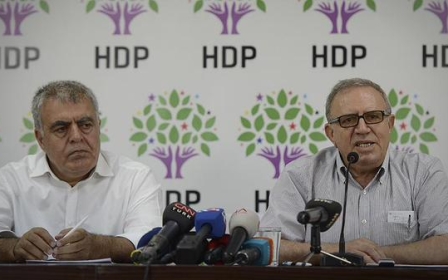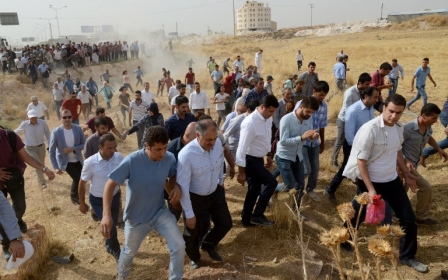ANALYSIS: Inter-Kurdish tensions point toward HDP-PKK divide

Since the 20 July attack which killed 32 activists on the Turkish-Syrian border town of Suruc and the subsequent breakdown of the ceasefire between the Kurdistan Workers’ Party (PKK) and the Turkish government, relations between the PKK and its closely affiliated pro-Kurdish People’s Democratic Party (HDP) has become increasingly strained.
Although the escalating violence has put the HDP, the Kurdish movement’s political wing, in a tough spot, analysts say that since the pro-Kurdish party passed the 10 percent threshold in June’s parliamentary elections, winning it 80 seats in parliament, a sharpening rivalry has arisen between the two groups.
“Since the 7 June elections, HDP and PKK have been in a framing competition to claim the victory of the elections,” said Mustafa Gurbuz, an expert on Kurdish issues and resident fellow at the Washington-based Rethink Institute. “It started as a war of words on the very night of the elections.”
Alev Yaman, a human rights activist focusing on Turkish-Kurdish issues, agrees that in the immediate aftermath of the June elections, the HDP’s 13 percent victory was seen as a threat by the PKK instead of being perceived as a victory for all Kurdish groups in Turkey.
Public statements by PKK leaders have indicated the growing discomfort between PKK and HDP leaders.
PKK leader Duran Kalkan lashed out at HDP co-chair Selahattin Demirtas saying: “Who is he, what has he accomplished?” reported Turkish newspaper Yeni Safak on 27 August.
HDP deputy Leyla Zana, a leading figure in the Kurdish political movement, threatened earlier in September to go on a hunger strike if the violence does not stop.
At the same time Demirtas called on the PKK to put down its arms and work toward an unconditional cessation of hostilities. “From wherever it is coming and whoever is doing it, violence must stop,” he said, while also referring to the soldiers killed by the PKK as “our sons”.
His words, commentators have pointed out, were unheard of by other representatives seen to be on the same ground as the PKK.
“The indifference of the PKK to HDP's calls for peace, and the fact that the HDP is comfortable taking such a position is a significant demonstration of the dynamic at work within Turkey's Kurdish movement at the moment,” said Yaman.
Renowned Turkish journalist Cengiz Candar, who has been working on the Kurdish issue for years, went as far as equating PKK-HDP tensions with those between HDP and AKP, telling the Daily Hurriyet News earlier his month that since the election results the PKK has wanted to weaken the HDP as much as the AKP government.
“Demirtas …is a political figure with a bright future…perhaps this was the very reason that the PKK acted as if it is discomforted by him, perceiving him as someone who should be eliminated through a trap,” Candar told Hurriyet.
Points of divergence
The main points of difference between the PKK and HDP are the two group’s visions for the Kurdish issue moving forward. According to analysts, while the HDP still has hope in a political resolution to the stalemate, the PKK is adamant that negotiated peace with the Turkish government is dead and the resumption of an armed struggle necessary.
“The PKK points to the government's intransigence in negotiations during the ceasefire as proof of the necessity of continued fighting,” said Yaman.
“The HDP, for its part, sees peace as a necessity for its growth as ‘a party of Turkey’. The HDP's ambition to act as a left-wing coalition with a political base that extends beyond Turkey's Kurdish population is being hamstrung by the renewed fighting,” she added.
According to co-director and research fellow at the London-based Turkey Institute, Mustafa Demir: “The escalating violence has increased the PKK’s tutelage over HDP… weakening HDP’s political clout [and showing] that its success depends on PKK’s popular support.”
The HDP’s election success has depended to some extent on votes coming from supporters of the PKK with both groups appealing to the same voter base. This reality has been at the crux of the tensions between PKK and HDP, say analysts.
“When Kurds saw HDP MPs struggling for Kurds’ democratic rights, Kurds started to question the existence of an armed group, essentially weakening the need for an armed struggle,” said Demir.
“Therefore the escalating violence and the state response in a way would 'justify' the existence of PKK’s armed struggle while weakening the hands of pro-Kurdish politics in the eye of Kurdish voters,” he added.
Turkish vs regional vision
Another point of divergence is the future vision of both groups. While the PKK has a more regional or pan-Kurdish outlook on the situation, the HDP is looking to establish itself as a Turkish party that represents groups beyond Kurds in the country.
“The PKK has more of a regional vision, encompassing Turkey and Syria, whereas the HDP has more of a Turkey-centric vision with a particular desire to reach out to parts of Turkey outside of the Kurdish-dominated southeast,” said Yaman.
Turkish leftists and secularists voted for the pro-Kurdish party during the June elections.
While both the PKK and HDP are in pursuit of local autonomy in the predominantly Kurdish southeast region of Turkey, the means envisioned by each group toward reaching this end goal are also different.
“HDP wants to achieve this [autonomy] democratically within the existing political system whereas the PKK wants to create de facto autonomous areas often through the use of arms,” said Yaman.
November elections
With early elections scheduled for 1 November, despite cracks in the Kurdish movement, wider incidents across Turkey will act to consolidate Kurdish support for HDP and even patch up some differences between the HDP and PKK.
According to Candar, while Demirtas has been showing “signs of a discrepancy from several elements of the PKK…the development of events [in Cizre] covered up any cracks that might have existed between the PKK and the HDP”.
HDP MPs said at least 20 civilians died in the southeastern town of Cizre during an eight-day siege, while residents said they felt they were being punished by President Erdogan for not voting for AKP in the June elections.
Yaman believes that support for the HDP will rise in the highly charged environment in Turkey and while support for the PKK is mixed, crackdowns on Kurdish provinces will play in the PKK’s favour too.
“The Turkish state has yet to appreciate the galvanising effect that certain flashpoints have on the Kurdish psyche. Erdogan and the AKP's Turkish nationalist rhetoric and approval of harsh measures in the Kurdish region have been received poorly by the Kurdish people,” explained Yaman.
The targeting of HDP offices across Turkey has been widely reported over the past few months while attacks targeting of Kurdish centres and business by far-right Turkish nationalists have surged over the past couple of weeks.
But while the charged environment may increase HDP votes among Kurds, Gurbuz says the situation is more complicated, specifically among those who do not support the PKK.
If the HDP still wins 13 percent of the votes in November’s elections, the movement can easily claim that the people are voting for HDP to support the PKK and not because of HDP’s push toward disarmament, explained Gurbuz.
“But HDP voters from Turkish left and Kurdish conservatives - who are against PKK violence - are in a tough position in the November elections,” said Gurbuz.
“If they choose not to support HDP this time, Erdogan's authoritarianism remains a threat. On the other hand, if they vote for HDP again, the PKK will claim these votes as a support for their violence.”
With the cessation of hostilities not in sight however, some commentators have expressed concern over the possible postponement of the vote. Others have also pointed toward practical implications that could impact the fairness of the elections the southeast region as it remains riddled with violence.
New MEE newsletter: Jerusalem Dispatch
Sign up to get the latest insights and analysis on Israel-Palestine, alongside Turkey Unpacked and other MEE newsletters
Middle East Eye delivers independent and unrivalled coverage and analysis of the Middle East, North Africa and beyond. To learn more about republishing this content and the associated fees, please fill out this form. More about MEE can be found here.




